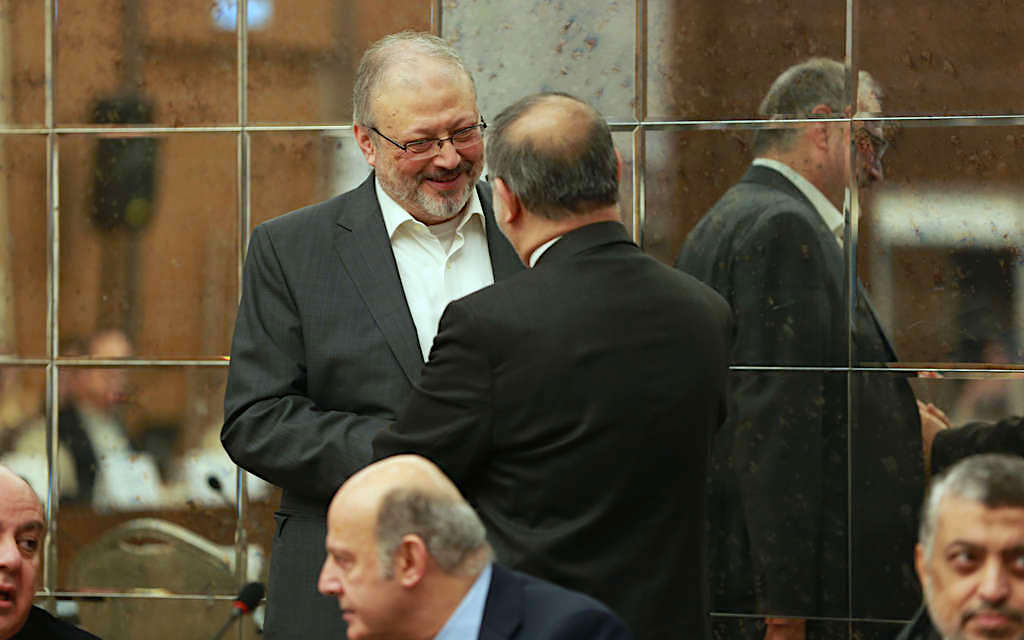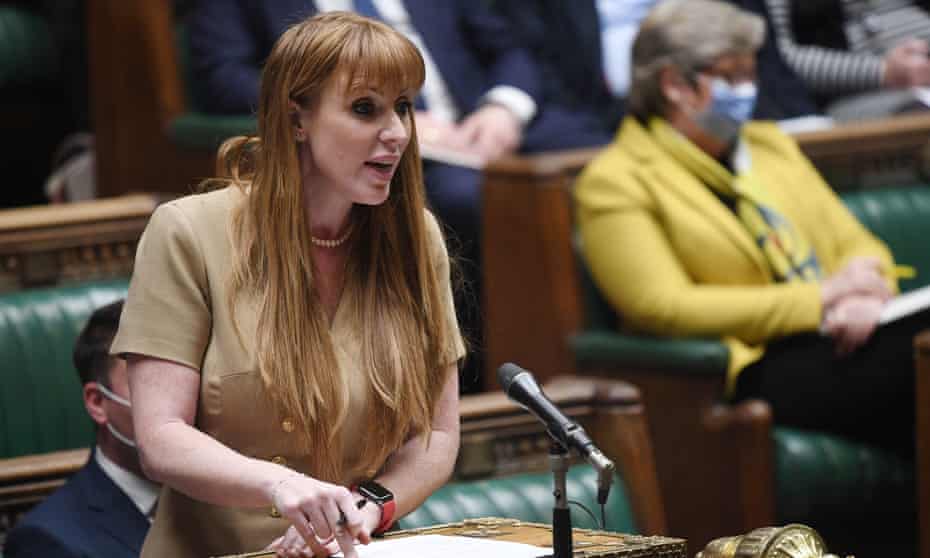The threat of voter suppression is perhaps more destructive because its influence is more subtle and its effects more consequential.
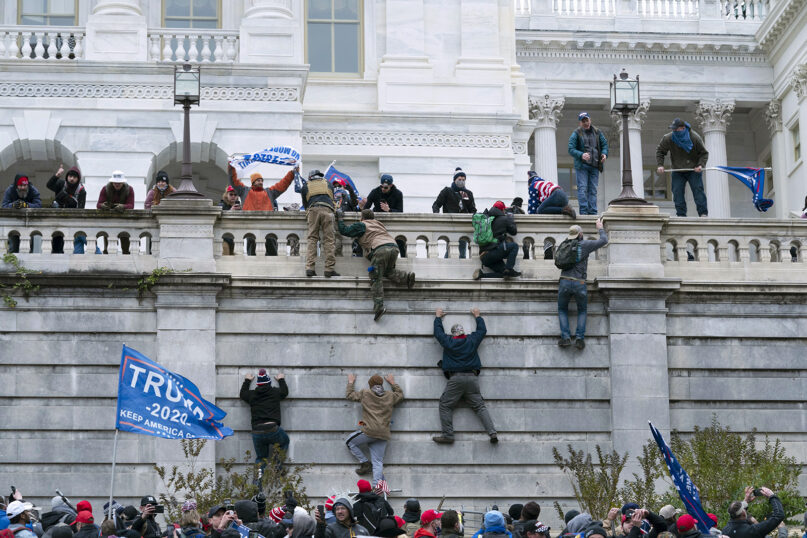
Supporters of President Donald Trump climb the west wall of the U.S. Capitol on Jan. 6, 2021, in Washington. The mob proceeded to breach the Capitol.
(AP Photo/Jose Luis Magana)
January 5, 2022
By Samuel L. Perry
(RNS) — One year ago at the Capitol riot on Jan. 6, 2021, the world witnessed one way in which Christian nationalism imperils American democracy. We’ve all seen photos and footage of the mob violence perpetrated by Americans waving Christian flags, clad in Christian clothing, saying Christian prayers. As some increasingly isolated and radicalized religious conservatives react to their loss of power, the threat of their political violence is real. But it is not the only way Christian nationalism jeopardizes our democracy.
The fact is, Christian nationalist ideology — particularly when it is held by white Americans — is fundamentally anti-democratic because its goal isn’t “government of the people, by the people, and for the people.” Its goal is power. Specifically, power for “true Americans like us,” Christians in an almost ethnic sense, those who belong — the worthy. Stemming from this, the most salient threat white Christian nationalism poses to democracy is that it seeks to undermine the very foundation of democracy itself: voting.
We can see this connection long before the 2020 presidential election or recent efforts to restrict voter access throughout the country. As historian Anthea Butler recounts, at a 1980 conference Paul Weyrich, co-founder of the Moral Majority, spoke about electoral strategy to Christian right leaders including Tim LaHaye, Phyllis Schlafly, Pat Robertson, Jerry Falwell Sr. and then-presidential candidate Ronald Reagan.
Weyrich famously explained:
“Many of our Christians have what I call the goo-goo syndrome. Good government. They want everybody to vote. I don’t want everybody to vote. Elections are not won by a majority of people. They never have been from the beginning of our country and they are not now. As a matter of fact our leverage in the elections quite candidly goes up as the voting populace goes down.”
In Weyrich’s own words, the goal of these Christian right leaders wasn’t more Americans exercising their democratic rights. The goal is “leverage” and, with it, victory. Over the next few decades, Weyrich and other organizations he co-founded, like the American Legislative Exchange Council, tirelessly promoted legislation to restrict voter access, guided by the belief that voting must be controlled, lest the wrong sorts of people determine the outcome.
In a recent study I conducted with co-authors Andrew Whitehead and Josh Grubbs, we documented this same strong connection between Christian nationalist ideology and wanting to limit voter access. We surveyed Americans just before the November 2020 elections and thus before Donald Trump’s “Big Lie” began to dominate the narrative on the right. We use a scale to measure Christian nationalism that includes questions about the extent to which Americans think the government should declare the U.S. a Christian nation, that America’s success is part of God’s plan and other such views.
Even after we accounted for political partisanship, ideological conservatism and a host of other religious and sociodemographic characteristics, Christian nationalist ideology was the leading predictor that Americans felt we already make it “too easy to vote.”
You may ask, “Who exactly is voting too easily?” The obvious answer is the bogeyman trope of fraudulent voters — those pets, dead people and undocumented immigrants Trump warned about in spring 2020. This myth of widespread voter fraud is decades old and has been thoroughly debunked numerous times. Yet, unsurprisingly, we also found that Christian nationalism is the leading predictor that Americans believe “voter fraud in presidential elections is getting rampant these days.” And it bears repeating: Americans who affirm Christian nationalism already felt this way before the 2020 presidential election.
But other evidence suggests Christian nationalism doesn’t just hope to exclude fraudulent voters. For adults who believe America should be a “Christian nation,” their understanding of who should vote is even more narrow. For example, we asked Americans whether they would support a policy requiring persons to pass a basic civics test in order to vote or a law that would disenfranchise certain criminal offenders for life. These questions hark back to arbitrary Jim Crow restrictions white Southerners used before the Voting Rights Act of 1965. Once again, Christian nationalism is the leading predictor that Americans would prefer both restrictions.
But why?
Part of the reason for this is, as Weyrich explained in 1980, electoral leverage. Americans who subscribe to Christian nationalism likely assume persons excluded by civics tests and lifetime felon disenfranchisement (younger Americans and ex-convicts who are disproportionately Black) would be political threats, not allies.
Yet another reason also involves how white Christian nationalists view voting in general. In data we collected in August 2021, we asked Americans to indicate whether they felt voting was a right or a privilege. Though constitutional language repeatedly states voting is a right for citizens, Americans still debate the issue. As I show in Figure 1, the more Americans embrace Christian nationalism, the more likely they are to view voting as a privilege (something that can be extended or taken away) rather than a right (something that shall not be infringed). Indeed, at the extreme end of Christian nationalism, the majority hold this view.
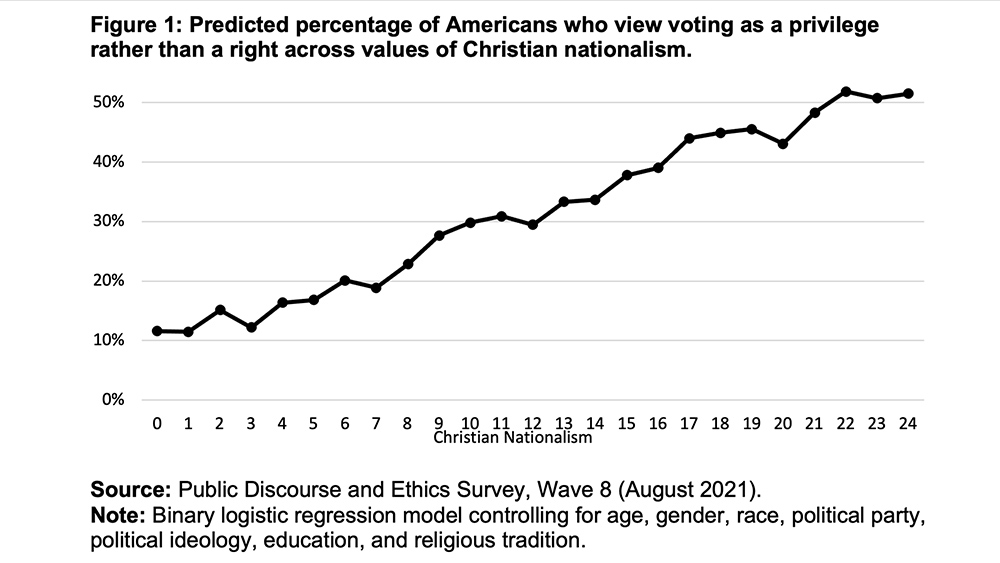
“Figure 1: Predicted percentage of Americans who view voting as a privilege rather than a right across values of Christian nationalism.” Courtesy graphic
Other evidence beyond voter access suggests Christian nationalism inclines Americans to favor institutional arrangements that preserve their political power. In the same October 2020 survey we used for the earlier study, we found that the more white Americans affirmed Christian nationalist ideology, the more likely they were to reject the popular vote as a means of selecting the president, to favor the Electoral College and to disagree that gerrymandering needed to be addressed to ensure fairer congressional elections (see Figure 2). Why? Almost certainly because these arrangements currently give white, rural, conservative Americans an electoral advantage even when they are numerical minorities. Again, the goal is power, not fairness or democracy.
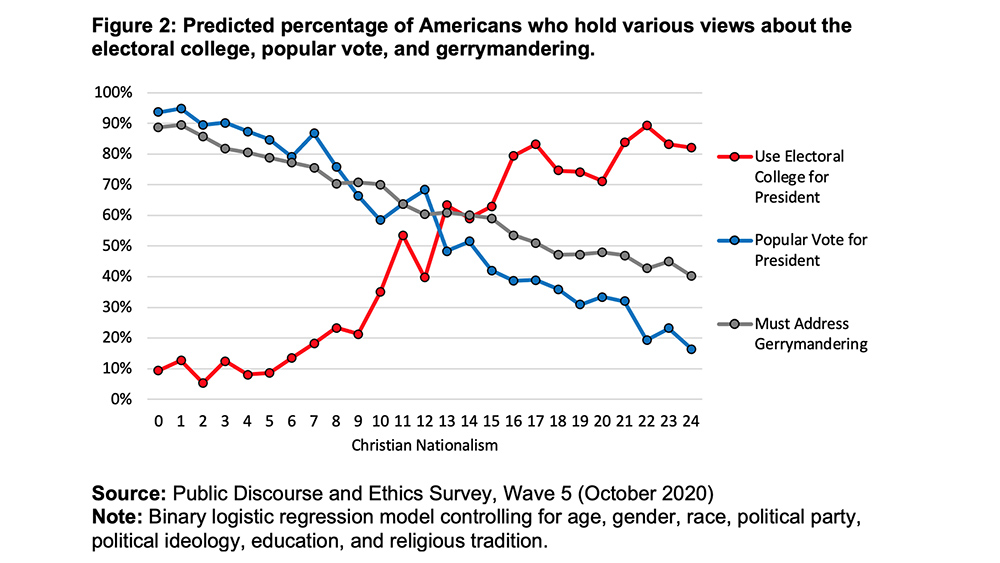
“Figure 2: Predicted percentage of Americans who hold various views about the electoral college, popular vote, and gerrymandering.” Courtesy graphic
As scholars of right-wing political movements point out, democracy is gradually eroded under some ideological covering, one that stokes populist anxiety with menacing tropes about cultural decline and justifies anti-democratic tactics to “save” or “restore” the nation — to make the nation great again. In the United States, white Christian nationalism is that ideological covering. In the minds of white Americans who believe America should be for “Christians like us,” increasing ethnic and religious diversity is a threat that must be defeated for God to “shed his grace on thee.”
Moreover, Americans who subscribe to Christian nationalism already thought voter fraud was rampant before November 2020. Today, in the aftermath of Trump’s “Big Lie” about a stolen election, which is still believed by over 80% of the most ardent believers in Christian nationalism, electoral integrity is viewed as hopelessly compromised. Thus, they see restricting voter access to those who prove worthy, and maintaining institutional advantages provided by the Electoral College and gerrymandering, as necessary strategies for preserving power and preventing what they see as their own imminent persecution under a Democratic administration.
The threat of Christian nationalist violence like what we saw on Jan. 6 is real. Yet because such threats are so obvious and shocking, and the role of Christian nationalism in them is so blatant, they make gaslighting about them more challenging. (Though Republican leaders are certainly trying, just the same.) In contrast, the threat of Christian nationalism as an ideological covering for voter suppression is perhaps more destructive because its influence is more subtle and its effects (electoral outcomes) are more consequential. Demagogues like Trump will no longer need to mobilize Christian nationalist violence after an electoral loss once they’ve ensured they’ll never lose in the first place.
(Samuel L. Perry is an associate professor of sociology at the University of Oklahoma. He is the author of two books on Christian nationalism, including the award-winning “Taking America Back for God: Christian Nationalism in the United States” (with Andrew L. Whitehead) and the forthcoming “The Flag and the Cross: White Christian Nationalism and the Threat to American Democracy” (with Philip Gorski). The views expressed in this commentary do not necessarily reflect those of Religion News Service.)
Ahead of the Trend is a collaborative effort between Religion News Service and the Association of Religion Data Archives made possible through the support of the John Templeton Foundation. See other Ahead of the Trend articles here.





